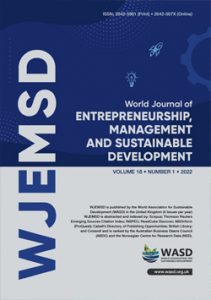Probit analysis of factors influencing rural employment promotion in southern Nigeria, Dr. Oluwatoyin Kolawole
Dr. Oluwatoyin Dare Kolawole
Okavango Research Institute
University of Botswana, Maun
Botswana
Email: tkolawole@ori.ub.bw/toyin_kolawole@yahoo.com
DOI: 10.1108/20425961211276642
Purpose: Poverty, inequality and unemployment challenges need to be adequately addressed if sustainable human development is to be achieved. Although these key issues are not mutually exclusive, the purpose of this paper is to identify factors influencing rural employment promotion (REP) in southern Nigeria.
Design/methodology/approach: A multi‐stage sampling procedure was used to select 60 rural communities in southern Nigeria. In all, 300 interviewees were sampled and interviewed using structured and unstructured interview schedules. Descriptive statistical techniques such as frequency, percentages, mean and standard deviation, etc. were used to describe and summarise the data. Probit analysis was employed to make deductions through the use of STATA package.
Findings: The result showed a pseudo R2 value of 0.3581, which is quite reasonable for qualitative dependent variable models. At p 0.01 level of significance, education (z=2.02), farm size (z=2.39) positively influenced the drive towards rural employment generation. Also, at p 0.01 level, the availability of banking institutions (z=1.94) and support from the family members (z=2.17) did strongly predict REP. Other predictors of REP were the disaggregated units of project type/orientation, which are production (z=1.67) and service‐oriented ventures (z=1.98) and they both had strong and positive influence on REP at p 0.05 and 0.01 levels of significance, respectively.
Research limitations/implications: The research only focused on south‐western Nigeria. Other geo‐political and ecological zones in the country would need future research exploration to allow for a country‐level generalisation of findings on rural employment.
Practical implications: The findings of the study have practical implication for future employment initiative/project implementation in Nigeria and in similar socio‐ecological contexts elsewhere. They serve as a baseline on which future research and development work could rely.
Social implications: The information generated in the study could serve as working tools for pro‐poor policy conceptualisation, formulation and implementation in developing economies and probably elsewhere. If genuinely implemented, it could enhance rural peoples' well‐being and quality of life.
Originality/value: As an original research, the paper offers new insights on crucial issues that influence rural employment promotion in Nigeria and probably elsewhere with similar (socio‐cultural, ecological, political and economic) contexts in the South.
Keywords: Nigeria; Rural areas; Employment; Poverty; Socio-economic regions; Ecology; Rural employment; Infrastructure; Policy; Probit.
Citation: Dare Kolawole, O. (2012), "Probit analysis of factors influencing rural employment promotion in southern Nigeria", World Journal of Entrepreneurship, Management and Sustainable Development, Vol. 8 No. 4, pp. 273-285. https://doi.org/10.1108/20425961211276642

